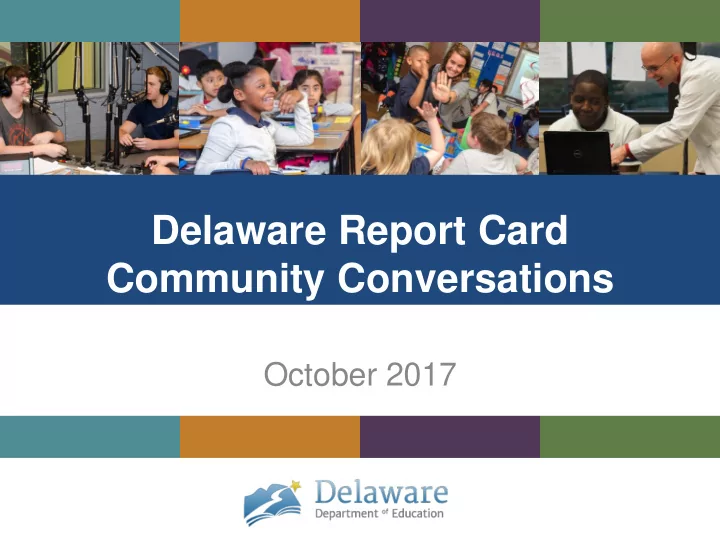

Delaware Report Card Community Conversations October 2017
Meeting Agenda ESSA Overview and Delaware Update Report Card Overview Delaware School Profiles Reporting New Items Report Card Timeline Report Card Terminology Report Card Requirements Next Steps 2
ESSA Overview Every Student Succeeds Act (ESSA) Civil Rights law to provide education for all students Gives states more flexibility than under the previous version of the law Allows for more state and local control than under the previous version of the law Under ESSA, states are required to outline their plans for: Supporting students in college and career readiness Measuring student progress State and District supports for lowest performing schools 3
ESSA in Delaware (1 of 2) Delaware’s ESSA plan was submitted in April 2017 Reflected Delaware’s educational priorities Outlined strategies for: Required assessments Accountability School, educator, and student supports Builds on Delaware’s successes 4
ESSA in Delaware (2 of 2) Delaware collected more than 1,000 comments and suggestions while drafting the ESSA plan Delaware’s ESSA plan was approved by the U.S. State Plan Department of Education on APPROVED August 2, 2017 5
Report Card Overview ESSA requires the creation of state, district and school report cards Report cards must be easy for parents, caregivers, and the other stakeholders to access and understand Report Cards must be published by December 31, 2018 State State District School Levels of Report Cards 6
School Profiles Delaware Law requires annual public reporting DOE fulfills the requirement through School Profiles 7
Reporting New Items Some of the new items that will be publicly reported in the Report Card include: Long-term goals and measurements of interim progress English language proficiency attainment District preschool programs Chronic absenteeism 8
Report Card Timeline 9
Community Conversations Expected Outcomes Understanding Education Terminology: Defining report card terms with clear explanations using common language Defining Report Card Elements: Ensuring all relevant data elements are being shared through the report card Determining Priorities: Understanding if information is considered “need to know”, “nice to know”, and “do not need to know” 10
Educational Terminology 11
Activity Each table has been given a set of educational terms and definitions Match each definition with its partner term Highlight any word that needs further explanation Purpose: Remove terminology barrier when communicating with parents and caregivers 12
Stakeholders Identified… What we say is not School Growth: “It is how always what stakeholders the school is growing. It would depend on how the hear. budget is; each school has a different budget.” Student Growth: “I’m a little lost, are Accountability: “It would they counting the mean that there is students?” someone actually looking at this and holding Proficiency: “Proficient schools accountable for is just enough to get by, what they say they’re not excel.” Climate: “I think rain. going to do.” They should change to ‘environment’.” Learning Heroes: Research Overview 13
Requirements Activity 14
Activity Each table has a unique set of report card requirements Determine with the people at your table which requirements are “need to know”, “nice to know”, and “do not need to know” Add any information that Purpose: was not a current Define Report Card requirement Elements and Priorities 15
Stakeholders Identified… Areas that we identify as important may not have the same value to parents and caregivers Learning Heroes: Research Overview 16
What Happens Next? 17
Stakeholder Timeline 18
How Do I Stay Informed? DOE website – School Profiles https://www.doe.k12.de.us/Page/3553 Email blast – sign-up sheet at sign-in table Email questions directly to the Report Card email at Delaware.ReportCard@doe.k12.de.us 19
Recommend
More recommend